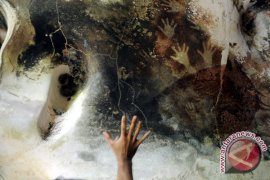Indonesia as a pluralist state and nation was formed on the basis of an agreement among all the elements of the country`s society that were of various religious and ethnic backgrounds.
Therefore, Vice President Boediono at a function to open the 10th Indonesian Mahasabha Parisada Hindu Dharma meeting in the Indonesian resort island of Bali on Sunday called on all religious communities in the country to continue cultivating inter-religious tolerance and harmony.
"Inter-religious harmony and tolerance, as well as social and cultural resilience should continue to be maintained, strengthened, and nurtured," the vice president said.
Boediono pointed out that all religions taught the importance of mutual understanding, respect, and love; and that the founders of the Indonesian nation were well aware of this fact.
According to the vice president, Indonesian society was pluralist because it was a composition of people with different religious beliefs, meaning that a certain religious group could well be the majority in one region but a minority in another region.
"Thus in a pluralist country, tolerance means that the majority group can protect the minority, and the minority group should be wise in determining their place in society," the vice president said.
Inter-religious tolerance and harmony in Indonesia was even admired by Pope Benedict XVI and US President Barack Obama who said it could be an example to the rest of the world.
According to the Catholic News Service in its official website www.catholicregister.org, Pope Benedict XVI said Indonesia could be an example of inter-religious harmony to the world.
Speaking to some 36 bishops of Indonesia who made a so-called "ad limina" visit to the Vatican on October 7, 2011, the pope said that by promoting dialogue and defending the rights of minorities, Catholics in Indonesia would contribute to the harmony of their nation and be an example to people in other parts of the world.
"Peaceful coexistence and cooperation among Indonesia`s population of various religious and ethnic groups means the country is "well-placed to make important contributions to the quest for peace and understanding among the peoples of the world," the pope said.
The pope told the bishops of Indonesia to bear witness to the image and likeness of God in each man, woman, and child by encouraging everyone to be open to dialog in the service of peace and harmony.
According to Pope Benedict, the first way to share God`s love with humanity was to be loving and charitable.
"This will also strengthen Indonesian society by promoting those values that your fellow citizens hold dear: tolerance, unity and justice for all citizens," the pope said.
Besides the pope, US President Barack Obama when visiting Indonesian in November 2010 said he was impressed by inter-religious tolerance in the country.
In his visit to Jakarta`s Istiqlal Mosque, Southeast Asia`s largest, Obama praised his childhood homeland`s spirit of tolerance as a model for Islam and the West.
The US president attentively listened to explanations from Istiqlal Mosque grand imam Ali Mustafa that the mosque was located just opposite Jakarta`s cathedral, symbolizing religious harmony and interfaith cooperation in Indonesia.
Obama held up Indonesia - which traditionally practices a tolerant form of Islam and has Christian, Hindu and Buddhist minorities - as an example of tolerance to the world in a tense age of colliding cultures.
"Even as this land of my youth has changed in so many ways, those things that I learned to love about Indonesia - that spirit of tolerance that is written into your constitution, symbolized in your mosques and churches and temples, and embodied in your people still lives on," Obama said.
But Religious Affairs Minister Suryadharma Ali admitted that as a pluralist country, Indonesia was not free from conflict.
At a meeting with a German parliamentary delegation, led by the country`s parliament deputy speaker, Wolfgang Thierse, in Jakarta recently, Suryadharma compared the Indonesian nation to a big family.
"As a family, small quarrels between husband and wife, brother and sister, and even parents and children, sometimes happen and are perhaps unavoidable," the minister said.
Suryadharma said that sectarian conflicts did occur at times in Indonesia but it was really beyond the will of the religious leaders and religious communities.
"I do not believe that there is ingrained hostility between Muslim and Christian communities in Indonesia," the United Development Party (PPP) general chairman said.
Suryadharma also explained the issue of freedom of worship because there were certain parties who considered this freedom in Indonesia to be restricted.
He said in this world there was no absolute freedom because there were always restrictions under the laws and regulations.
Suryadharma said that everything in Indonesia was governed by law, and religious life was also subject to the religion`s laws and regulations.
"Therefore the freedom of worship , including that of determining religious teaching, should be based on the rule of law," said the religions affairs minister.
He also explained to the German parliament delegation that
Islam arrived a long time ago in Indonesia with peace and not with the sword, let alone a bomb, and that the arrival of Islam did not eliminate the culture which was there before.
The religious affairs minister also said that there was someone who intentionally wanted to create disharmony and sectarian conflict in Indonesia.
He said someone wanted to create disharmony because the issue of religion was classified as sensitive and easily ignited sectarian conflict.
"There is a mastermind from a certain party who intentionally wants to create disharmony among religious communities," Suryadharma Ali said.
(Uu.O001/HAJM/A014)
Reporter: by Otniel Tamindael
Editor: Priyambodo RH
Copyright © ANTARA 2011











